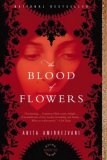Summary | Excerpt | Reading Guide | Reviews | Beyond the Book | Readalikes | Genres & Themes | Author Bio

A Novel
by Anita AmirrezvaniCHAPTER ONE
In the spring of the year that I was supposed to be married, a comet launched itself over the skies of my village. It was brighter than any comet we had ever seen, and more evil. Night after night, as it crawled across our skies spraying its cold white seeds of sorrow, we tried to decipher the fearsome messages of the stars. Hajj Ali, the most learned man in our village, traveled to Isfahan to fetch a copy of the chief astronomer’s almanac so we would know what calamities to expect.
The evening he returned, the people of my village began assembling outside to listen to the predictions for the months ahead. My parents and I stood near the old cypress, the only tree in our village, which was decorated with strips of cloth marking people’s vows. Everyone was looking upward at the stars, their chins pointing toward the sky, their faces grave. I was small enough to see under Hajj Ali’s big white beard, which looked like a tuft of desert scrub. My mother, Maheen, pointed at the Sunderer of Heads, which burned red in the night sky. “Look how Mars is inflamed!” she said. “That will add to the comet’s malice.”
Many of the villagers had already noticed mysterious signs or heard of misfortunes caused by the comet. A plague had struck the north of Iran, killing thousands of people. An earthquake in Doogabad had trapped a bride in her home, suffocating her and her women guests moments before she was to join her groom. In my village, red insects that had never been seen before had swarmed over our crops.
Goli, my closest friend, arrived with her husband, Ghasem, who was much older than we were. She greeted me with a kiss on each cheek.
“How are you feeling?” I asked. Her hand flew to her belly.
“Heavy,” she replied, and I knew she must be worried about the fate of the new life inside her.
Before long, everyone in my village had gathered, except for the old and the infirm. Most of the women were wearing bright bell-shaped tunics over slim trousers, with fringed head scarves over their hair, while the men were attired in long white tunics, trousers, and turbans. But Hajj Ali wore a black turban, indicating his descent from the Prophet Mohammad, and carried an astrolabe wherever he went.
“Good villagers,” he began, in a voice that sounded like a wheel dragging over stones, “let us begin by heaping praise on the first followers of the Prophet, especially upon his son-in-law Ali, king of all believers.”
“May peace be upon him,” we replied.
“This year’s predictions begin with poor news for our enemies. In the northeast, the Ozbaks will suffer an infestation of insects so fierce it will destroy their wheat. In the northwest, troop desertions will plague the Ottomans, and even farther west, in the Christian kingdoms, inexplicable diseases will disarrange the lips of kings.”
My father, Isma’il, leaned toward me and whispered, “It’s always good to know that the countries we’re fighting are going to have miserable luck.” We laughed together, since that’s how it always was.
As Hajj Ali continued reading from the almanac, my heart skipped as if I were climbing a mountain. I was wondering what he would say about marriages made during the year, which was what I cared about the most. I began fiddling with the fringe on my head scarf, a habit my mother always urged me to break, as Hajj Ali explained that no harm would come to paper, books, or the art of writing; that earthquakes would occur in the south but would be mild; and that there would be battles great enough to tinge the Caspian Sea red with blood.
Hajj Ali waved the almanac at the crowd, which is what he did when the prediction he was about to read was alarming. His assistant, who was holding an oil lamp, jumped to move out of his way.
Copyright © 2007 by Anita Amirrezvani
Your guide toexceptional books
BookBrowse seeks out and recommends the best in contemporary fiction and nonfiction—books that not only engage and entertain but also deepen our understanding of ourselves and the world around us.